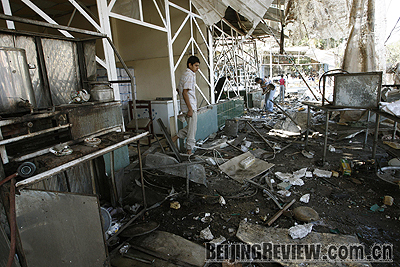|
|

A PERSISTENT EVIL: Despite crackdown efforts, the specter of terrorism continues to haunt the world. The picture shows a Sunni community in Baghdad, Iraq, after a terrorist bombing on November 10 (AFP) |
The financial crisis takes a toll around the world
The international financial situation has deteriorated since the subprime mortgage crisis broke out in the United States in August 2007. The world is experiencing three catastrophes-the financial crisis, food price hikes and oil price fluctuations, and the depreciation of the U.S. dollar.
The U.S. Treasury Department took over mortgage giants Fannie Mae and Freddie Mac on September 7. Shortly after, it launched a $700-billion economic rescue plan, only to be frustrated by the magnitude of the crisis. Lehman Brothers Holdings Inc., a New York-based global financial services firm, filed for bankruptcy protection on September 15, giving rise to a global financial storm.
After an initial period of inaction, European countries rushed to rescue their own markets. The German Government announced that it would guarantee all private savings accounts in Germany. Britain unveiled a 500-billion-pound (about $760-billion) rescue package. Iceland nationalized all its banks. The European Union (EU) later came up with a collective response. The Chinese Government adopted 10 measures to expand domestic demand and earmarked 4 trillion yuan ($571.4 billion) for this endeavor. Despite the measures taken by many countries, the world has yet to curb the spread of the financial crisis.
The International Monetary Fund (IMF) estimated that the annual growth rate of the world economy would drop to 3 percent in 2009. On November 15, leaders from 20 countries held a financial summit in Washington D.C. to discuss measures to deal with the financial crisis. In their joint declaration, the leaders vowed to enhance cooperation and work together to "restore global growth and achieve needed reforms in the world's financial systems." Despite the pledges, they achieved little of substance at the summit.
Multipolarization gains momentum
As the only superpower, the United States has seen its international leadership decline. Many countries, even its allies, would not follow its orders. Its unilateralism and preemptive approach have failed in international relations. It is unable to resolve the Iranian nuclear issue or the Iraq issue and has not been successful in bringing about dialogue between the Palestinians and Israelis. Western Europe and Japan have been preoccupied with domestic difficulties. As a result, their international influence is also on the decline.
In contrast, developing countries represented by Brazil, Russia, India and China (BRIC) have become more active on the international political stage. Adopting models of development different from Western countries, developing countries, especially BRIC countries, are important engines driving world economic growth. Statistics show the ratio of developing countries' gross domestic product (GDP) to the world total rose from 15.9 percent to 25 percent from 1990 to 2006. Goldman Sachs estimated that the GDP of the BRIC countries would surpass that of the United States, Japan, Germany, Britain, France, Italy and Canada combined by 2027.
|
